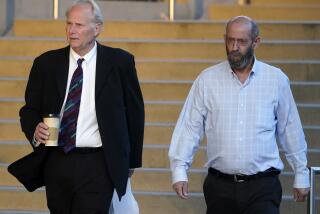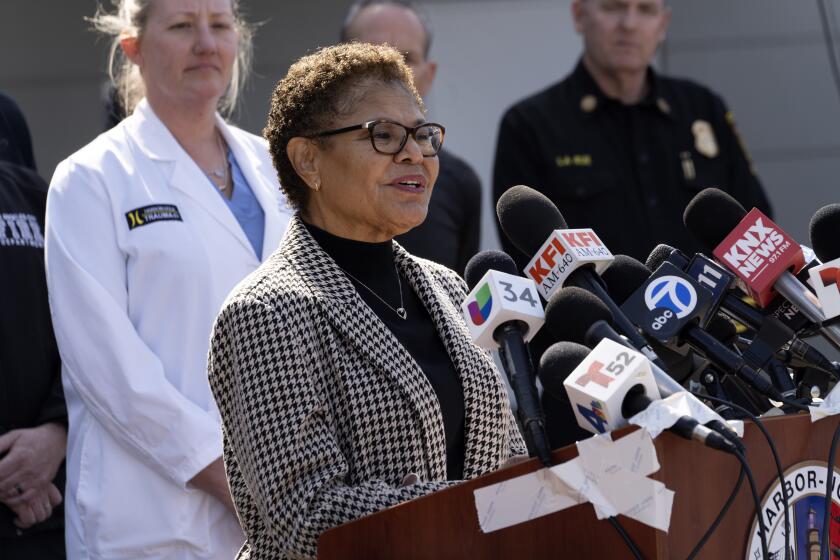California and the West : Justices Seem to Favor Media in Disclosure Case : Court: Prosecutors seek murder confession outtakes from TV station. Panel leans toward news organization’s shield law arguments.
The California Supreme Court appeared reluctant Wednesday to give prosecutors the right to obtain unpublished information gathered by news reporters in a criminal case.
The court heard arguments on a 1998 appeals court ruling that said prosecutors can compel a Sacramento television station to turn over unaired videotape from a jailhouse interview. A suspect confessed to a murder during the interview.
Under a 1980 shield law, the news media in California have immunity from contempt citations for refusing to reveal a source or unpublished information. But the state Supreme Court previously decided the protection is not absolute.
Carving out an exception for criminal defendants, the court said in 1990 that defendants can compel disclosure if they can show unpublished information will help their defense. The 3rd District Court of Appeal in Sacramento, ruling in the jailhouse interview case, said last year that prosecutors have similar rights.
Although the state high court seemed divided by the case during a hearing Wednesday, several members indicated that they found the media’s arguments for withholding the footage persuasive.
Justice Marvin Baxter noted that voters approved the shield law by a lopsided margin--73.3%--and that no opposition surfaced. Justice Ming W. Chin told a lawyer for the prosecution that the law was intended to protect access to information and that reporters, like prosecutors, engage in “truth seeking.”
The case arose out of a videotaped confession by Anthony Lee DeSoto, who is charged with murder. After learning that DeSoto had confessed to San Joaquin County sheriff’s investigators that he had killed his cellmate, KOVR-TV sought an interview with the suspect.
During a jailhouse meeting, DeSoto told a KOVR reporter on videotape that he killed his former cellmate. The station broadcast portions of the interview over two nights.
When prosecutors sought the footage that was not shown, the station refused to produce it. A trial judge viewed the footage and said he found a “reasonable possibility” that the outtakes would materially assist the prosecution’s case.
When the station still refused to turn over the tape, the court found KOVR news director Ellen Miller in contempt and ordered her jailed until the outtakes were produced. The court, however, did not enforce the order pending the station’s appeal.
In ruling against the station last year, the Court of Appeal noted that the 1990 Crime Victims Justice Reform Act guaranteed the people--the prosecution--due process rights.
The initiative, Proposition 115, limited the rights of defendants and made procedural changes intended to speed up criminal proceedings.
“The people have a state due process interest in the disclosure of evidence relevant to a criminal prosecution,” the Court of Appeal decided.
Charity Kenyon, a lawyer for KOVR-TV, said the crime victims measure was not intended to strip the news media of legal protections under the California Constitution.
California is one of 13 states that have given the news media immunity from contempt out of the 31 states with shield laws, she said.
Chief Justice Ronald M. George asked her whether the constitutional rights of criminal defendants exceed those of the prosecution.
“Absolutely,” Kenyon replied. She pointed out that the criminal justice system gives defendants several advantages, including acquittal if evidence of guilt is not established beyond a reasonable doubt.
Justice Joyce L. Kennard buttressed the distinction between the rights of a defendant and the prosecution by noting that an individual’s right to due process--to a fair trial--is an ancient right.
“The government cannot deprive an individual of liberty without fair procedure,” Kennard said.
Deputy Atty. Gen. Susan J. Orton urged the state high court to uphold the ruling against the television station. She said it would not impede the news gathering process because the facts of the case are uncommon. Most murder suspects do not confess their crimes to television reporters, she said.
“This is such a rare and unusual case,” she said.
The California Newspaper Publishers Assn. has filed arguments in favor of the television station while a state prosecutors organization has asked the court to compel media disclosure in such cases.
The court will decide the case within 90 days.
More to Read
Start your day right
Sign up for Essential California for news, features and recommendations from the L.A. Times and beyond in your inbox six days a week.
You may occasionally receive promotional content from the Los Angeles Times.







